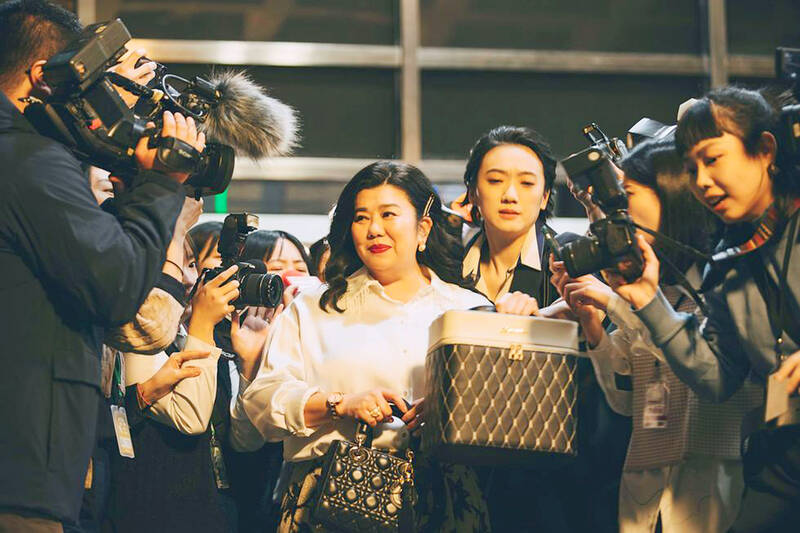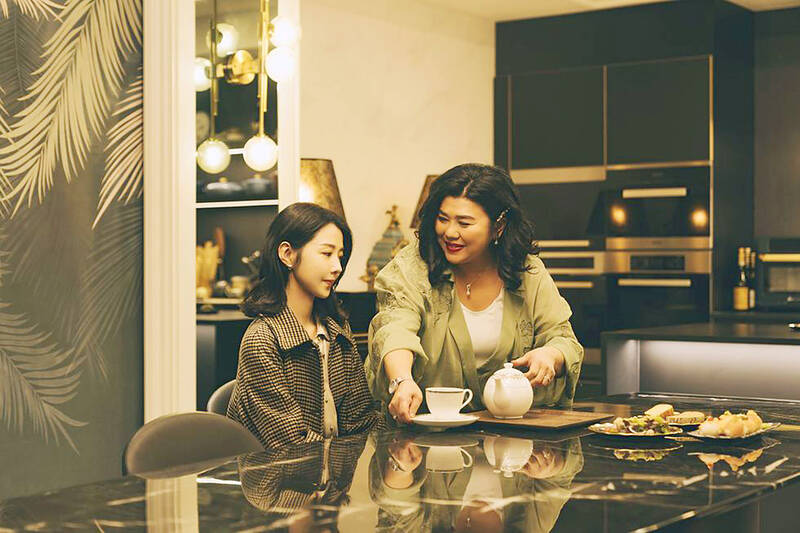First of all, a personal gripe: why does every movie seem to depict journalists at their absolute worst, as if they’re little more than heartless monsters who harass people with horribly insensitive questions and are willing to do anything to get a scoop? While the stereotypes are true to a certain extent and Taiwan’s sensational media landscape is only getting more toxic, this exaggerated, overly-simplistic trope is getting old.
Lost in Perfection (惡女) takes the ugly side of the news business a step further, featuring newly promoted news station anchor Li-mei (Ivy Shao, 邵雨薇) who works in a cut-throat environment where she sometimes has to bend the rules to succeed. Everything is going well for her on the surface — she’s sweet, smart and ambitious and is about to marry a wealthy and handsome dentist with whom she shares a posh apartment.
Things get out of hand, however, when middle-aged Hsiu-lan (Lin Mei-hsiu, 林美秀), unceremoniously dubbed by the media as an “unattractive femme fatale,” is arrested for allegedly killing three of her former lovers after accepting large amounts of cash from them. The men were all found to have committed suicide by burning coal. Li-mei realizes that Hsiu-lan is the woman who her father (Mark Lee, 李天柱) a long-time widower, had abruptly introduced the previous night as his new fiancee. The father is exactly the type who would fall for romance scams and despite the deaths, insists that Hsiu-lan is innocent and their love is real.

Photo courtesy of Catchplay
Due to the lack of evidence, the case against Mei-hsiu isn’t strong. Desperate to save her father, Li-mei begins plotting ways to ensure Hsiu-lan is put behind bars by working with dashing prosecutor Guo-lun (Rhydian Vaughan, 鳳小岳).
The crux of the film is the battle between the two women, who are essentially polar opposites. Li-mei is beautiful, well-educated and career-driven but has bad luck with men (even her dentist beau leaves her at one point), while Hsiu-lan came to Taipei as a poor country girl and was able to achieve her lavish lifestyle through knowing exactly how to please these lonely men despite her modest looks.
Rarely showing their true emotions and intentions, the calculating nemeses trade underhanded barbs and maneuvers throughout the film, making for some stirring psychological fare. Li-mei is clearly outclassed by the wily Hsiu-lan, but she has the power of the media at her disposal and is increasingly willing to abuse it.

Photo courtesy of Catchplay
Social norms may automatically give Li-mei the higher moral ground, which she tries to impose on Hsiu-lan, but Hsiu-lan is not ashamed of her actions, even proud of her ability to give men everything they truly desire. They simply killed themselves because they could not bear the fact that she broke up with them, she maintains. And this morality is further blurred as the truth becomes murkier and the struggle intensifies. Who’s really the “evil woman,” per the film’s Chinese-language title, here?
Lost in Perfection is a stark departure for director Sung Hsin-yin (宋欣穎), whose previous feature, On Happiness Road (幸福路上), is a whimsical, colorful and heart-warming animation that delves into Taiwan’s history through a woman’s life journey.
Both films do touch on the roles and expectations of women in Taiwanese society, although it feels that On Happiness Road presents a more nuanced, relatable picture overall. The women in Lost in Perfection, from the leads to the ruthless news station boss, are more one-dimensional, serving largely to present different moral aspects.
Shao and Lin deliver convincing performances that drive the show, but the film gets bogged down in the middle, with significant screen time spent on the confusing details of the case and cheesy love scenes instead of deeper character exploration. It just feels that everyone — including the hapless, simple-minded men — could have been fleshed out more to emphasize the human aspect of it all.

Google unveiled an artificial intelligence tool Wednesday that its scientists said would help unravel the mysteries of the human genome — and could one day lead to new treatments for diseases. The deep learning model AlphaGenome was hailed by outside researchers as a “breakthrough” that would let scientists study and even simulate the roots of difficult-to-treat genetic diseases. While the first complete map of the human genome in 2003 “gave us the book of life, reading it remained a challenge,” Pushmeet Kohli, vice president of research at Google DeepMind, told journalists. “We have the text,” he said, which is a sequence of

On a harsh winter afternoon last month, 2,000 protesters marched and chanted slogans such as “CCP out” and “Korea for Koreans” in Seoul’s popular Gangnam District. Participants — mostly students — wore caps printed with the Chinese characters for “exterminate communism” (滅共) and held banners reading “Heaven will destroy the Chinese Communist Party” (天滅中共). During the march, Park Jun-young, the leader of the protest organizer “Free University,” a conservative youth movement, who was on a hunger strike, collapsed after delivering a speech in sub-zero temperatures and was later hospitalized. Several protesters shaved their heads at the end of the demonstration. A

In August of 1949 American journalist Darrell Berrigan toured occupied Formosa and on Aug. 13 published “Should We Grab Formosa?” in the Saturday Evening Post. Berrigan, cataloguing the numerous horrors of corruption and looting the occupying Republic of China (ROC) was inflicting on the locals, advocated outright annexation of Taiwan by the US. He contended the islanders would welcome that. Berrigan also observed that the islanders were planning another revolt, and wrote of their “island nationalism.” The US position on Taiwan was well known there, and islanders, he said, had told him of US official statements that Taiwan had not

We have reached the point where, on any given day, it has become shocking if nothing shocking is happening in the news. This is especially true of Taiwan, which is in the crosshairs of the Chinese Communist Party (CCP), uniquely vulnerable to events happening in the US and Japan and where domestic politics has turned toxic and self-destructive. There are big forces at play far beyond our ability to control them. Feelings of helplessness are no joke and can lead to serious health issues. It should come as no surprise that a Strategic Market Research report is predicting a Compound